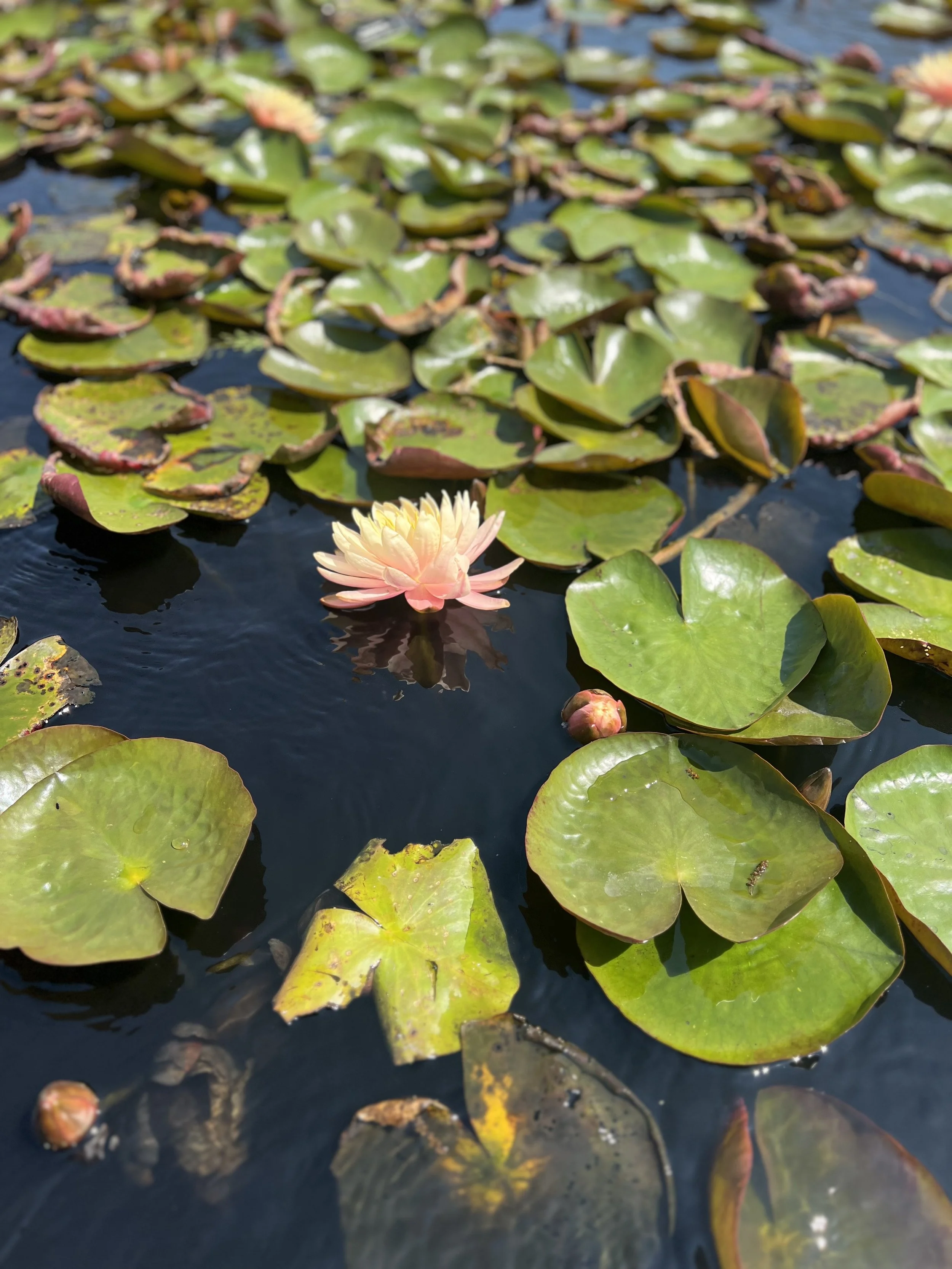Rising From the Waters: Lessons in Joy and Survival
Mangkala Ubol
I spent time with the Mangkala Ubol at the New Orleans botanical garden—a water lily that symbolizes beauty, purity, and innocence, rising above murky waters without blemish. I was struck by its energy and felt it captured the spirit of the people of New Orleans: the ability to overcome difficulties, to transcend their surroundings while maintaining their essence.
I knew the pain, the pain of witnessing what happened to New Orleans during Katrina, and I carried it with me for so long. I still do.
I took my seven-year-old daughter to New Orleans, the city I fell in love with, the one that led me into the healing world where I stand today. I wanted her to experience the energy of the city that changed me. I went to explore the land, the histories, the technologies of joy—the practices and wisdom that communities use to survive and thrive. I wanted to understand: How do people get through? How have they survived atrocity after atrocity, hardship after hardship?
At the root of what happened with Hurricane Katrina—as it plays out so many times and places in history—is dehumanization. The racist history of Louisiana and this country, starting from enslavement, was reproduced through the tragedy of Katrina: neglect and mismanagement in the aftermath, media representation that emphasized criminality over resilience, socioeconomic and racial inequalities that left Black and low-income communities most vulnerable, and political discourse that minimized or ignored their suffering.
And yet the people of New Orleans resisted by holding onto their humanity. They kept their traditions intact and found ingenious expressions of freedom and resistance in spite of oppressive conditions. They improvised and created a culture that left its footprint not only on New Orleans and Louisiana, but on the world through jazz, music, dance, Congo Square, religion, and spirituality.
Some say there's an energy here that's dark, demonic, rooted in despair and Black pain. But what I also saw was Black art, Black finesse and style, creativity, Black love, community, traditions, warmth. Super Sunday and Congo Square Festival—days of fashion, bodies on display, food, jewelry, an unapologetic energy. The ability to create joy in spite of neglect, in spite of the slow genocide they've endured, and the ways they create fun and community and dance even while feeling suffocated and trapped.
I also felt the despair, depression, pain, and neglect. Twenty years later, so much of what Katrina destroyed has been left behind, neglected, forsaken, and left for dead. A native told me, "The US doesn't give a damn about New Orleans or any other Black inner city in America." Another said, "People are dying, they are dying all around," speaking of the policies and lack of resources and environmental hazards impacting Black, Brown, and economically depressed communities.
What I learned is this: If there were ever a symbol for the expression "this joy that I have, the world didn't give it and the world can't take it away," it would be the resilience and the people of New Orleans.
Joy is one of the core values of Whole With Joy. Our joy is all we have—our essence, our light, our power. Joy lives in how we practice it together. New Orleans deepened this understanding for me, witnessing a community that embodies this truth so powerfully. A place I fell in love with through witnessing the pain Katrina brought, what I witnessed broke my heart open. There would be no Whole with Joy without Hurricane Katrina and New Orleans.
And why is joy so important? Because there are so many thieves of joy—systems of oppression that feed harm and violence to our minds, bodies, and spirits. Forces that come to "kill, steal, and destroy."
In New Orleans, thieves of joy have incarcerated, disenfranchised, dehumanized, neglected, abandoned & left Black New Orleanians for dead. Yet in spite of it all, the people still dare to have joy.
What if people who possess these technologies of joy, wisdom & resilience were placed in conditions that supported their ability to thrive? Affordable housing. Youth programs. Trauma-informed care & policies. Voting rights. Healthcare. Environmental justice. Education. Where we lived in a society that valued, revered, and looked to them for guidance on how we all can get through?
Just imagine how prosperous would all of our lives be?
Look at the Mangkala Ubol—rising from murky waters, maintaining its beauty and purity despite its surroundings. See the spirit of the people of New Orleans in that water lily. Consider how their wisdom, their technologies of survival and joy, might teach us something essential about our own survival. About how we too might be transformed. What if we allowed their resilience to show us new ways of being? What if their joy became a blueprint for our own liberation?
Prosperity is both personal and collective. Your healing and joy matter not just for you, but for all of us. At Whole with Joy, we offer different pathways to reclaim the prosperity that is your birthright—through coaching that honors your full self, ecotherapy that reconnects you with Earth's wisdom, and healing circles that remind us joy multiplies when shared.
Ready to explore what prosperity can look like in your life? Join our community of women, organizations, and healers who are choosing joy, embodying wholeness, and creating abundance that nourishes all of life.
Learn more about our offerings at wholewithjoy.com

